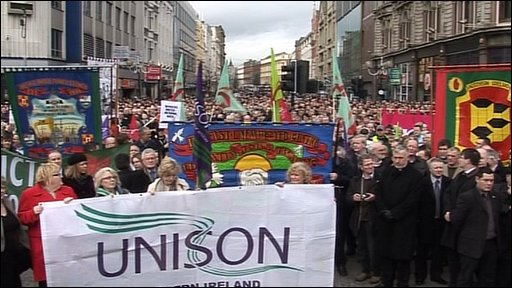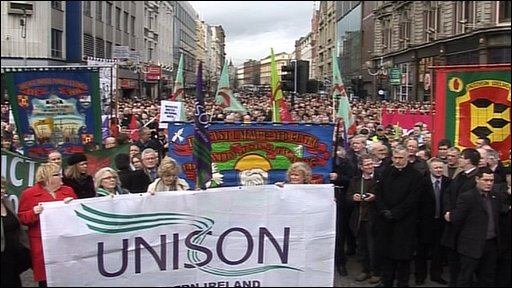éirígí 01/12/10
As the clock counts down to what many believe will be the harshest budget in the history of the Twenty-Six County state, resistance appears to be gathering momentum.
éirígí has long argued that the savage assault being waged against the working class by the neo-liberal establishment in Dublin can be overturned through a sustained campaign of civil disobedience and mass protests. In mobilising for the fight back, éirígí has called for people to lobby in their workplaces, their unions and their communities for the organisation of a general strike. Continue reading “Resistance Mounts Against the Blood Budget”
Ireland country report
The following report was drawn up by the Irish Marxist group, Socialist Democracy
10 November 2010
I Introduction
The Irish State is one of the most globalised in the world and for nearly two decades was held up as a model of economic development across Europe and further afield. Now it is in severe crisis and faces bankruptcy. The Irish Government has applauded its ‘first mover’ advantage in its efforts to enforce austerity – that it was taking the steps that sooner or later all other states would be forced to take. The small and weak character of the Irish State means that it often exaggerates trends that exist elsewhere. For all these reasons the Irish experience is an important one for others to study.

Continue reading “Ireland country report”
IMF Will Entrench the Economics of the Madhouse
The following article is by the Irish socialist-republican group, éirígí
20/11/10
ICTU Protest, Saturday November 27th, 12pm, Wood Quay, Dublin Budget Night Protest, March to Leinster House. Assemble 5.30pm, Tues December 7th, Wolfe Tone Monument, Stephen’s Green, Dublin Introducing the catastrophic €400 billion [£340 billion] blanket bank guarantee scheme in September 2008, Twenty-Six County finance minister Brian Lenihan was keen to offer reassurance to those genuinely fearful of the consequences of such economic recklessness.

Continue reading “IMF Will Entrench the Economics of the Madhouse”
“We won’t pay for their crisis!”
Mike Kay
In Europe, the capitalist crisis has hit the working class much harder than it has so far in New Zealand. But in many countries, the victims are fighting back. A single slogan has found universal appeal – “We won’t pay for their crisis!” Here follows a brief survey of some of the highlights of the past few months:
Britain has seen its biggest upsurge in class struggle since the start of the Great Miners Strike, 25 years ago. Waves of unofficial strikes over union-agreement coverage on construction projects spread through power station and refinery sites across the country in early February. The strikes were in defiance of the anti-union laws, and not under the control of union leaders. At the early stages of the dispute there was a worrying element of nationalism, with the slogan “British jobs for British workers” appearing on some picket lines, and picked up gleefully by the bourgeois media.
However, as the movement gained coherence, more class-based demands came to the fore, such as: for all workers on site to be under the national union agreement for the engineering construction industry. The debate is still raging on the British left as to how much of a role anti-migrant worker sentiment played in spreading the dispute, but revolutionaries clearly have a vital task of confronting an undercurrent of nationalism, whilst relating positively to a spontaneous outpouring of working class rage. Continue reading ““We won’t pay for their crisis!””
Building an alternative movement in Ireland
The Spark December 2008 – January 2009
A new revolutionary political organisation has emerged in Ireland in the past two years to take on British occupation in the north and social inequality throughout the whole country. The organisation is called éirígí; its chairperson, Brian Leeson, was interviewed by Philip Ferguson late last year for The Spark.
Philip Ferguson: Could you tell us how you first got involved in political activity?
Brian Leeson: I suppose I first became politically active in the summer of 1989 when I attended a large protest in Dublin that was demanding a British withdrawal from occupied Ireland. It was called to mark the 20th anniversary of British troops being re-deployed onto Irish streets back in August 1969. For a few months before the demonstration I had been becoming more politically conscious, particularly with regard to the war that was then raging in the occupied Six Counties.
What struck me most about that day was the contrast between the sheer size of the protest and the tiny amount of media coverage it received. Despite the fact that more then 20,000 marched that day, it hardly registered on the political landscape at all. Of course, this was at a time when state censorship by both the London and Dublin governments excluded republican spokespeople from the airwaves.
Within a couple of weeks of that demonstration I had taken a decision to become politically active. I applied to join Sinn Féin, but at 15 years of age I was too young. Instead, I started to sell the An Phoblacht newspaper each Saturday morning outside of the General Post Office on Dublin’s O’Connell Street – a building which fittingly had served as the headquarters of the 1916 Rebellion.
From then on I became ever more involved in the republican struggle and the Provisional Movement, which I remained a part of until early 2006.
Continue reading “Building an alternative movement in Ireland”
